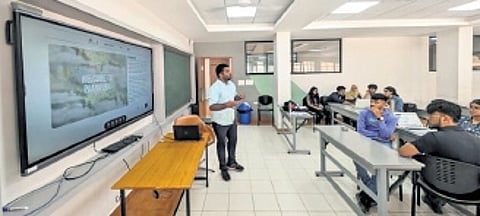

BENGALURU: The water crisis in Bengaluru has become one of those annual occurrences over the last five years where, despite ample warnings and precedents, people are late to act. Whether it’s news of lakes drying up or the concrete-covered city failing to retain any groundwater, the situation is bound to worsen if the city continues to walk in a memory fog. Fields of View (FoV), a game design organisation based in the city, is trying to raise awareness and contribute through Hanigalu, a game that simulates water crisis management.
“We conceptualised the game just before the pandemic, in collaboration with Azim Premji University as part of the Small Grants Programme of the Bengaluru Sustainability Forum. The idea was to create a ward-level water security planning tool; pick a ward and create awareness among people about the water security. But soon after the pandemic hit, we decided to make it a digital game,” says Yashwin Iddya, the chief knowledge officer at FoV.
Set in the fictional city of Paanipura, Hanigalu tasks players with navigating the city’s water crisis. Players step into the shoes of researchers for the Paanipura Municipal Corporation. “One very important aspect is that while the game is built on a fictional city, the data of the present version of the game is actually based on Bengaluru and relies heavily on data,” says Iddya, who has been conducting online sessions to raise awareness.
The game begins with players understanding Paanipura’s geography, demographics, and water systems, after which they delve into the sources of water, supply mechanisms, the demand-supply gap, and even the economics of water distribution.
“After the briefing, the playing part begins where different crises arise in the city and players are given different choices. For example, if a pandemic occurs and residential water consumption increases, the group has to debate among themselves on the solution to this problem from the given choices and then see the consequences of their decisions,” says Iddya.
While Hanigalu highlights pressing water issues facing Bengaluru to great effect through real-time data, gathering such data has been a huge challenge.
“There is a lack of adequate data and continuous data on different aspects of water security. So the second part of the game was aimed at highlighting this gaps. If you want to plan for a sustainable city, data is crucial for effective planning,” explains Iddya, who aims to engage more deeply with policymakers to influence water security planning.